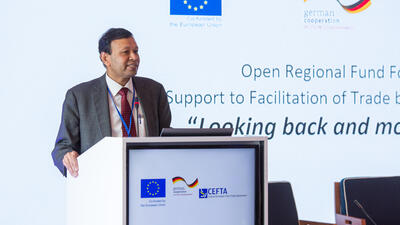2011 WEDF: Sustainable Development
The 2011 World Export Development Forum focused on ways to develop sustainable tourism with the announcement of four projects to connect small- and medium-
sized enterprises in least developed countries to the tourism industry.
Held on 10-11 May in Istanbul, Turkey within the framework of the Fourth United Nations Conference on the Least Developed Countries (LDC-IV – see at the bottom), the 2011 World Export Development Forum (WEDF) brought together high-level tourism experts from the private and public sectors to address the theme of ‘Private Sector Engagement with Least Developed Countries (LDCs) for Tourism-led Growth and Inclusive Sustainable Development’.
As ITC’s flagship event, WEDF provides a forum for discussion, sharing of best practices and an opportunity to work towards solutions in trade challenges faced by developing countries and economies in transition. ITC chose the theme of tourism for the 2011 WEDF because 30 out of 49 LDCs identified, through their Diagnostic Trade Integration Studies, that the development of the tourism industry is a feasible way to participate in the global economy and thereby reduce poverty. ITC consulted with public- and private-sector partners, including the World Tourism Organization (UNWTO), ITC’s supporting partner for WEDF, to identify the best ways in which it can work towards tourism development.
In most LDCs tourism is already a major export earner, but the growing significance of the industry worldwide highlights the opportunity for further job creation and economic growth. In her opening address, ITC Executive Director Ms. Patricia Francis said tourism is one of the top contributors to job creation and can be of direct local benefit if a high percentage of purchases are made locally and communities are constructively engaged.
As Turkey hosted LDC-IV and is itself an example of a tourism development success story, Turkish officials provided success stories and lessons learned from the country’s point of view. In his keynote speech Turkish Deputy Prime Minister Mr. Ali Babaçan described the development of the country’s tourism industry over the past 30 years, noting that today twice as many people are employed in tourism as in manufacturing. Turkey is now the eighth most important tourist destination in the world with nearly 29 million visitors annually. However, Mr. Babaçan also highlighted the importance of protecting the cultural and physical environment on which tourism depends.
Key topics explored at WEDF included partnership-led sustainable tourism development, ethical investment, engaging women vendors in the tourism supply chain, resource management, recovering tourism after a crisis, and strategies for inclusive tourism development and linkages to other sectors, including handicrafts and agriculture.
Ms. Francis highlighted that despite a decade of global attention since LDC-III in Brussels in 2001, the state of LDCs had undeniably worsened. There are more LDCs now, and they are more impoverished. From a trade point of view, the evidence produced in ITC’s 2010 Market Access, Transparency and Fairness in Global Trade report shows that the 33 LDCs reviewed retained on average only 14 cents out of every US$ 100 of export earnings.
Public-private partnerships and the right conditions are essential
One of the key messages to emerge from WEDF was the important role that public-private partnerships play in tourism development.
‘Tourism-led growth is possible for many least developed countries. The variety of goods and services involved in the tourism supply chain leads to a broad impact in terms of poverty reduction. But it also requires a commitment from the private sector and the public sector to work together in the development of sustainable tourism for local benefit,’ said Ms. Francis.
‘Policymakers, private-sector investors, and community players all must be involved to create the right kind of framework to have the right kind of investment, ’ said Ms. Francis in emphasizing the necessity to think about different approaches and the importance of the private sector in generating growth and creating jobs.
World Trade Organization (WTO) Director- General Mr. Pascal Lamy noted that the right policies must also be in place. ‘It is also a well-known fact that like in other low-income countries, tourism in LDCs is dependent on inward flows on FDI (foreign direct investment) and towards this many LDCs are taking steps to promote investment in this sector. It therefore goes without saying that for the LDCs to fully exploit the potential presented by this sector to be a driver for economic growth and development, there has to be in place a set of core policy principles which will facilitate and encourage FDI flows.’
The Secretary-General of the United Nations Conference on Trade and Development (UNCTAD), Dr. Supachai Panitchpakdi, emphasized the importance of policies that ensure local communities benefit from tourism development.
‘Currently, in a number of LDCs and other countries with limited economic diversification, including Small Island Developing States, the majority of revenues from tourism do not go to local operators but to foreign firms. Whilst foreign investment and presence in the tourism sector can bring valuable benefits, in terms of employment, knowledge, training and human resource upgrading, careful attention needs to be paid by policymakers as to how to increase the pro-poor impacts of tourism expenditures,’ said Dr. Supachai.
ITC develops pilot projects to engage SMEs in tourism value chain
As an outcome of the conference, ITC announced the development of pilot projects to connect small- and medium-sized enterprises (SMEs) in LDCs to the tourism industry.
‘What our research before the event and interactions during it have shown us is that there is definite interest in exploring opportunities in LDCs,’ said Ms. Francis. ‘What we need to do to achieve the investments that we want is to think differently about how we do things. Policymakers, private-sector investors, and community players all must be involved to create the right kind of framework to have the right kind of investment.’
Leading up to WEDF, ITC hosted online teleconferences with high-level tourism executives and consultants from around the world to discuss their experiences in LDCs and potential plans for investment. The information gleaned from these conferences informed the focus areas for WEDF plenary sessions and a pre-WEDF workshop in Nairobi. With the aim of taking the first steps in the development of three potential pilot projects through the involvement of private- and public-sector experts, the pre-WEDF workshop developed project ideas to be further developed during the main sessions of the WEDF programme (see box WEDF Output Development).
In WEDF sessions dedicated to exploring the different potential projects, relevant country participants were joined by an expanded group of experts from the public sector, private sector and interested parties, including ITC and other UN agency partners, for a broader range of expertise and knowledge sharing.
As a result of the WEDF workshops, pilot projects in Tanzania, Ethiopia and Uganda will now be further developed in-country and validated by local stakeholders. This will take place with a view to producing viable projects that have been developed through a collaborative process. The projects are:
• Integrating agriculture into the tourism supply chain – Focusing on connecting farmers producing fresh fruit and vegetables to commercial agro-industry operations in the tourism sector in Tanzania, this project will further examine the most successful methods being used in other countries to empower farmers and create a connection to tourism businesses.
• Inclusive tourism as a market opportunity – In addressing inclusive tourism through the protection and promotion of cultural heritage and handicrafts, this project will focus on two areas: cultural heritage in Ethiopia and trade development for micro-artisans and artists in Uganda.
Additional WEDF outcomes also included:
• The strengthening of a public-private partnership to engage women vendors in the tourism value chain in the Pacific. ITC will work with the Platform for Action on Sourcing from Women Vendors in this project to create a public-private partnership between the governments of New Zealand and Australia, Carnival Cruise lines and ITC to investigate ways to more fully involve women in the tourism value chain in the Pacific region; and
• The development of a guide for LDCs on managing tourism after a crisis. Led by UNWTO, this project will create a guide for restoring tourism in an LDC after a natural or man-made crisis.
ITC will work with relevant partners in LDCs to further research and develop the pilot projects. The aim is for local private- and public-sector partners in the countries to eventually take over leadership of the projects.
ITC worked with nine other UN agencies, including UNWTO, the International Labour Organization (ILO), UNCTAD, UN Development Programme (UNDP), UN Industrial Development Organization (UNIDO), UN Educational, Scientific and Cultural Organization (UNESCO) and the WTO, to create the UN Steering Committee on Tourism for Development (SCTD). By harnessing the strengths and expertise of each agency and creating synergies between UN organizations, the Committee will deliver more coordinated and efficient technical assistance and support to developing countries. The Committee is now creating a toolkit that explores how countries can better interact with international organizations for tourism development.
For further information, including session summaries and downloads, visit www.intracen.org/wedf.
WEDF 2011 - Summary of key messages
• Tourism should be approached in a sustainable manner
• It is important to prioritize tourism in development strategies
• There is an absolute need for security and political stability
• A circuit approach involving regional partners is highly desirable
• The role of the state in policy, legal and regulation creation is essential, but there is also a need to reduce bureaucracy and streamline licensing processes
• The empowerment of local communities and increasing their share in benefits of tourism is critical
• Public-private partnerships are essential
• The issue of retention of earnings and reduction of leakages is one that confounds most LDCs
• Training and human capacity development must be a high priority
• Coordination and coherence with other economic sectors is important
• Effective marketing and positioning strategies are important to achieve successful branding and create a niche in the market
• It is important to learn from the experiences of other countries and share success stories.
UN LDC-IV Conference recommits to aid increases and favourable market access for LDCs
A 10-year international action plan for the 48 LDCs was announced at the conclusion of the Fourth UN Conference on the LDCs hosted by Turkey in May.
The agreement followed several months of negotiations and a call at the opening of LDC-IV by UN Secretary-General Ban Ki-moon for a ‘comprehensive and ambitious programme of action for sustained economic growth’ in LDCs.
Through the Istanbul Programme of Action, countries agreed to work towards favourable market access conditions for all LDCs, including through the reduction or elimination of arbitrary or unjustified non‑tariff barriers.
Developed countries committed to realizing the 0.15-0.20% of national income target for official development assistance (ODA), representing
a significant increase in ODA to LDCs, since aid levels currently remain at slightly less than 0.1% of donors’ gross national income.
The hallmark of the plan is an emphasis on productive capacity – building infrastructure, human capital and governance capabilities in LDCs.
‘The stress on productive capacity is favoured by LDCs as a means to modernize and diversify economies, create jobs and engage sustainable means to eventually eradicate poverty,’ said UN Under-Secretary-General Cheick Sidi Diarra, the High Representative for the LDCs, Landlocked Developing Countries and Small Island Developing States.
In an era of high food prices, priority action has been assigned to revitalizing agriculture and food security. The need to deal with the adverse effects of climate change is also highlighted in the Programme. Development partners and LDCs committed to good governance, rule of law, human rights, gender equality and women’s empowerment, and democratic participation.
For further information visit www.un.org/wcm/content/site/ldc.













